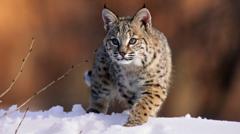Twenty big cats, including a Bengal tiger and four cougars, have succumbed to bird flu at the Wild Felid Advocacy Center in Washington over recent weeks. This shocking outbreak has left the sanctuary's team devastated. "This tragedy has deeply affected our team, and we are all grieving the loss of these incredible animals," the sanctuary posted on Facebook following the distressing events. The avian virus, primarily transmitted through contact with infected wild birds, spreads through respiratory secretions or by mammals ingesting infected birds.
Due to this serious health threat, the facility remains under strict quarantine, with public access halted. The sanctuary's director, Mark Mathews, shared that the deaths, which occurred between late November and mid-December, are unprecedented. "We've never had anything like it; they usually die basically of old age," Mathews told the New York Times. "Not something like this; it's a pretty wicked virus."
The situation emerges as bird flu continues to pose risks to livestock including cattle and poultry across the United States, alongside affecting humans. The sanctuary announced multiple casualties: five African serval cats, four bobcats, two Canada lynx, and a Bengal tiger—leaving only 17 cats at the facility.
According to the sanctuary's post, "Cats are particularly vulnerable to this virus, which can cause subtle initial symptoms but progress rapidly, often resulting in death within 24 hours due to pneumonia-like conditions." The CDC reports that bird flu has previously infected poultry in the US, with cases in cattle beginning in March. As of April 2024, there are 61 reported human cases, with low risk to the general public and no sustained human-to-human transmission. One individual has been hospitalized with severe symptoms this month in Louisiana. Amid these troubling developments, California's Governor Gavin Newsom recently declared an emergency regarding outbreaks among dairy cows, to ensure that the government can expedite its response efforts.



















